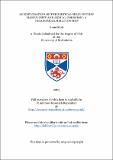Files in this item
Masculinity and sexual coercion : a paradoxical relationship
Item metadata
| dc.contributor.advisor | Reicher, Stephen | |
| dc.contributor.author | Muir, Grant | |
| dc.coverage.spatial | 296 p. | en_US |
| dc.date.accessioned | 2018-06-19T13:27:50Z | |
| dc.date.available | 2018-06-19T13:27:50Z | |
| dc.date.issued | 2003 | |
| dc.identifier.uri | https://hdl.handle.net/10023/14260 | |
| dc.description.abstract | Previous work on masculinity and sexual coercion has proposed either that sexual coercion is an expression of a traditional ideology of masculinity, or that sexual coercion is a resource in the construction of masculinity. That is, they have proposed that masculinity is either cognitive or strategic. It is proposed, in this thesis, that these viewpoints should be integrated and that masculinity should be thought of as both cognitive and strategic. Using the SIDE (Social Identity Definition and Enactment) model as a framework, there would, in relation to masculinity and sexual coercion, seem to be a paradox. That is, on the one hand, traditional masculinity is associated with the inclination to be sexually coercive, that there is a traditional ideology of masculinity which people internalise and which influences their behaviour. However, on the other hand, the actual expression of sexual coercion undermines masculinity. That is, men who engage in sexual coercion are perceived, by other men, as abusing their power and as less masculine, as not real men. Five studies are presented which support this notion of a paradox. However, this paradox is slightly different to that originally proposed. Rather than it being the case that men who most endorse traditional masculinity being those who most endorse coercion against women, it is those who we describe as being 'insecure' in their traditional masculinity who are most inclined to be coercive. A further two studies are presented which working from a basic assumption of this thesis, that the relationship between men and women is a relationship of unequal power consider, firstly, when the paradox might arise and shows that a challenge by a woman is perceived as a threat to masculinity. Secondly, in addressing how men might resolve the paradox, the final study considers the contexts in which coercion might be enacted and shows that when a challenge engenders feelings of threat to masculinity, this may translated into the enactment of sexual coercion, but only in a private context. The implications of this research and possible future directions are discussed. | en_US |
| dc.language.iso | en | en_US |
| dc.publisher | University of St Andrews | |
| dc.subject.lcc | HQ1090.M9 | |
| dc.subject.lcsh | Masculinity | en |
| dc.subject.lcsh | Rape | en |
| dc.title | Masculinity and sexual coercion : a paradoxical relationship | en_US |
| dc.type | Thesis | en_US |
| dc.type.qualificationlevel | Doctoral | en_US |
| dc.type.qualificationname | PhD Doctor of Philosophy | en_US |
| dc.publisher.institution | The University of St Andrews | en_US |
This item appears in the following Collection(s)
Items in the St Andrews Research Repository are protected by copyright, with all rights reserved, unless otherwise indicated.

